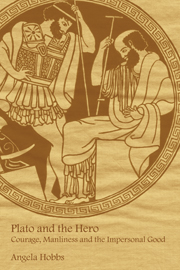Book contents
- Frontmatter
- Contents
- Acknowledgements
- Preface
- Glossary
- 1 The puzzle of Plato's thumos
- 2 Thumos, andreia and the ethics of flourishing
- 3 Arms and the man: andreia in the Laches
- 4 Odd virtue out: courage and goodness in the Protagoras
- 5 Why should I be good? Callicles, Thrasymachus and the egoist challenge
- 6 Heroes and role models: the Apology, Hippias Major and Hippias Minor
- 7 The threat of Achilles
- 8 Plato's response: the valuable as one
- 9 Alcibiades' revenge: thumos in the Symposium
- Epilogue: The weaver's art: andreia in the Politicus and Laws
- Bibliography
- Index
8 - Plato's response: the valuable as one
Published online by Cambridge University Press: 01 October 2009
- Frontmatter
- Contents
- Acknowledgements
- Preface
- Glossary
- 1 The puzzle of Plato's thumos
- 2 Thumos, andreia and the ethics of flourishing
- 3 Arms and the man: andreia in the Laches
- 4 Odd virtue out: courage and goodness in the Protagoras
- 5 Why should I be good? Callicles, Thrasymachus and the egoist challenge
- 6 Heroes and role models: the Apology, Hippias Major and Hippias Minor
- 7 The threat of Achilles
- 8 Plato's response: the valuable as one
- 9 Alcibiades' revenge: thumos in the Symposium
- Epilogue: The weaver's art: andreia in the Politicus and Laws
- Bibliography
- Index
Summary
THE BEAUTIFUL AND THE GOOD
Socrates' reply is, of course, founded on the Forms. The reason that this life is not of great significance is that reality lies elsewhere (500b), and the reason death is to be welcomed rather than feared is that it is simply the sloughing off of the body and the release of the logistikon into the purely intellectual realm of Forms which is its true home (611b–612a). Furthermore, if the Forms are the divine (500C9) origin of all the goodness and beauty in the phenomenal world, then it would seem that divinity is not capricious or dangerous. There is also a point which is implicit in the Republic and explicit in the Symposium: if all beautiful loved ones (and loved objects) participate in the single source of Beauty itself, then they will all, Socrates thinks, be beautiful in the same way. The beloved is therefore not unique and irreplaceable, as Achilles mistakenly believes, but the replaceable token of an enduring type; for this chilling reason, too, the fear of his or her loss or death will be greatly diminished.
Equally important from our present perspective is the fact that the Forms preclude the necessity of making tragic choices between noble and beneficial courses of action. There are two possible ways in which this might be so. The more common, and less controversial, reading is that the ultimate cause of both all good and all beautiful particulars is the same, namely the Form of the Good.
- Type
- Chapter
- Information
- Plato and the HeroCourage, Manliness and the Impersonal Good, pp. 220 - 249Publisher: Cambridge University PressPrint publication year: 2000



